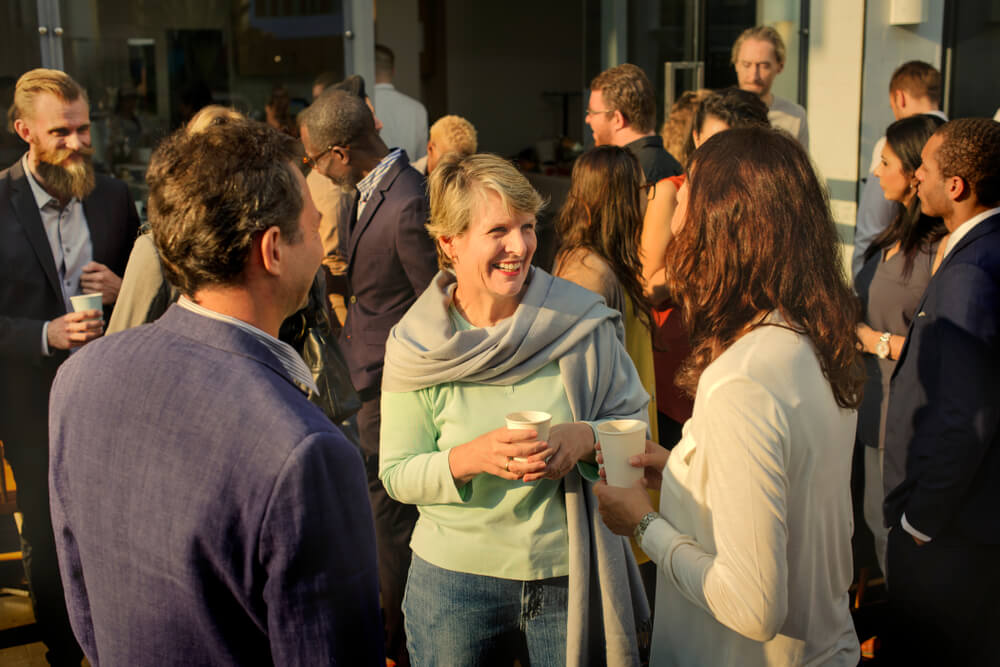As we look ahead to 2025, the dynamic world of corporate events is undergoing significant transformations, shaped by technological innovations, evolving attendee preferences, and an increasing emphasis on sustainability. In this rapidly changing landscape, understanding the top event trends in 2025 is crucial for businesses aiming to create impactful and engaging experiences.
From the rise of hybrid events that blend physical and virtual elements to personalized and data-driven content curation, the future of event planning promises to be more immersive and tailored than ever before. Sustainable practices and wellness initiatives are also taking center stage, reflecting a growing commitment to environmental responsibility and attendee well-being.
In this exploration, we at PlugIn will delve into these emerging trends, offering insights that empower corporate event planners and attendees alike to navigate and thrive in this exciting era of corporate events.
Hybrid and Virtual Experiences
Expanding Audience Reach
Hybrid events allow businesses to expand their audience reach significantly. By combining in-person and virtual elements, companies can engage attendees who prefer the convenience of online participation while still catering to those who value face-to-face interactions. This dual approach ensures that no one is left out, regardless of geographic or time constraints. Additionally, enhanced virtual platforms with interactive features can make online participation feel just as immersive as being there in person.
This model not only broadens accessibility but also provides opportunities for global networking and collaboration. With the potential for increased attendance and engagement, hybrid events can offer a substantial return on investment for corporate event planners. As we move into 2025, leveraging the strengths of both physical and virtual formats will be key to maximizing event impact and audience engagement.
Immersive Virtual Platforms
The evolution of virtual platforms is at the forefront of the hybrid event trend, offering immersive experiences that rival traditional gatherings. In 2025, these platforms will incorporate advanced features like 3D environments, virtual reality (VR) rooms, and augmented reality (AR) interactions, providing attendees with a sensory-rich experience.
Participants can explore virtual exhibition halls, engage in real-time Q&A sessions, and participate in workshops, all from the comfort of their own space. These technologies allow event planners to innovate, creating dynamic and engaging content that can be personalized to individual preferences. By using gamification, interactive polls, and live chats, virtual platforms can boost audience engagement and participation. As these technologies continue to advance, they will play a crucial role in redefining the scope and impact of corporate events, making them accessible and appealing to a broader audience.
Personalization and Customization

Data-Driven Segmentation
Data-driven segmentation is revolutionizing the way corporate events are tailored to attendees’ needs. By leveraging data analytics, event organizers can gain valuable insights into attendee preferences, behaviors, and interests. This enables them to create more personalized experiences that resonate deeply with each participant. For example, using data to segment the audience allows planners to customize agendas, content tracks, and networking opportunities to suit specific groups.
This targeted approach not only enhances attendee satisfaction but also increases engagement levels, as participants receive content that is relevant and valuable to them. Furthermore, data-driven segmentation can extend to aspects such as catering options and marketing strategies, ensuring that every element of the event aligns with the audience’s expectations. In 2025, harnessing the power of data will be essential for creating impactful corporate events that meet and exceed attendee expectations.
Tailored Event Elements
Tailoring event elements to individual preferences is becoming a crucial aspect of personalization in corporate events. This customization extends beyond agendas and content to include various aspects like catering, event design, and even branded swag. By offering personalized meal options, event planners can cater to dietary restrictions and preferences, enhancing the attendee experience. Similarly, incorporating interactive design elements that reflect the audience’s interests can create a more engaging and relatable environment.
Personalized swag bags with items that attendees find useful or enjoyable add a thoughtful touch, reinforcing the connection between the brand and its audience. Additionally, by integrating feedback loops, organizers can refine these elements for future events, continuously improving the level of personalization offered. As we advance into 2025, the ability to tailor every aspect of an event will become a defining feature of successful corporate gatherings, leading to higher satisfaction and stronger attendee loyalty.
Sustainability in Event Planning
Eco-Friendly Practices
Eco-friendly practices are becoming integral to event planning as sustainability takes center stage in 2025. Corporate event planners are increasingly adopting measures to minimize environmental impact, such as reducing waste and choosing sustainable materials. Digital invitations and event apps replace paper, significantly cutting down on paper use. Venues with green certifications are preferred, as they often incorporate energy-efficient systems and sustainable waste management practices. Catering companies offering locally-sourced and organic menu options are also in high demand, aligning with attendees’ growing interest in sustainability.
Moreover, the use of biodegradable or reusable materials for decor and event supplies further reduces environmental footprints. These practices not only help in conserving resources but also resonate with environmentally-conscious attendees, enhancing brand reputation. As the focus on eco-friendliness intensifies, incorporating sustainable practices will be crucial for any event aiming to be socially responsible and forward-thinking.
Choosing Green Venues
Selecting green venues is a pivotal step in embedding sustainability into corporate event planning. As businesses strive to reduce their carbon footprint, venues that offer eco-friendly facilities become highly desirable. These venues often incorporate sustainable practices such as solar energy, rainwater harvesting, and efficient waste management systems. Additionally, they may have LEED (Leadership in Energy and Environmental Design) certification, indicating adherence to high environmental standards.
By choosing such venues, event planners not only support environmental stewardship but also align with the growing expectations of eco-conscious attendees. This choice can enhance the overall brand image and demonstrate a commitment to sustainability. Furthermore, these venues often provide resources and assistance to help organizers implement green initiatives, ensuring that the event runs smoothly while minimizing its environmental impact. Emphasizing green venue selection is a practical and impactful way to contribute to a more sustainable future in event planning.
Wellness and Mindfulness Initiatives

Integrating Wellness Activities
Integrating wellness activities into corporate events is becoming increasingly important as organizations recognize the value of attendee well-being. In 2025, expect to see a variety of wellness options incorporated into event schedules, ranging from meditation sessions and yoga classes to interactive fitness challenges and mindful breathing exercises. These activities provide attendees with the opportunity to relax and recharge, fostering a more balanced and productive event experience.
Offering healthy catering options, such as fresh, organic meals and snacks, can also support participants’ physical well-being. Additionally, creating designated quiet zones or relaxation lounges where attendees can retreat for a moment of calm can significantly enhance their overall experience. By prioritizing wellness, event planners not only improve participant satisfaction but also demonstrate a commitment to their attendees’ holistic health. This focus on well-being can lead to more engaged and energized participants, ultimately contributing to the success of the event.
Healthy Catering Options
Incorporating healthy catering options into corporate events is a vital aspect of promoting wellness and mindfulness among attendees. As event planners seek to align with the growing health-conscious trends, offering nutritious and balanced meals becomes increasingly important. Menus featuring fresh, locally-sourced, and organic ingredients can cater to a diverse range of dietary preferences and restrictions, including vegetarian, vegan, gluten-free, and keto options. Ensuring that these choices are both delicious and visually appealing can enhance the dining experience and leave a lasting impression on participants.
Additionally, providing hydration stations with infused water and herbal teas can encourage attendees to stay refreshed throughout the event. By prioritizing healthy catering, organizers not only contribute to the physical well-being of their guests but also support their ability to focus and engage fully.
This commitment to health can enhance the overall atmosphere of the event, making it more enjoyable and beneficial for everyone involved. If you need more time and information on this topic, our team at PlugIn is here for you so do not hesitate to contact us today!


